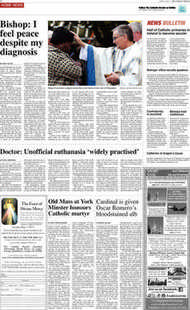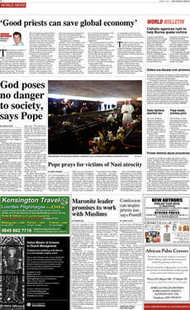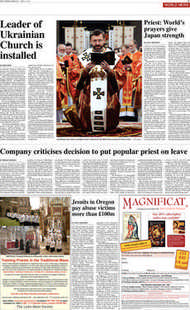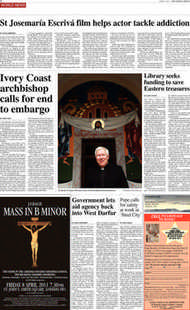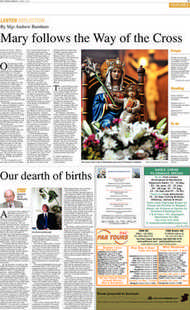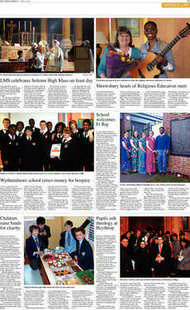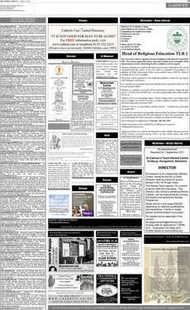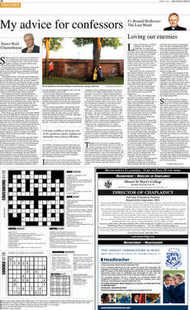Page 13, 1st April 2011
Page 13

Report an error
Noticed an error on this page?If you've noticed an error in this article please click here to report it.
Tags
Share
Related articles
Church Seeks End To Libya Conflict
Pope Appeals For Aid For Victims Of Libyan Clashes
Pope Appeals 'in The Name Of God' For End To Violence
Benedict Xvi Gives 'state Of The World' Address
Bishops Urge Lebanese To Take Control
The Church can help to resolve the Libyan conflict
Pope Benedict XVI this week called for a ceasefire in Libya, saying he was “progressively more concerned about the wellbeing and safety of civilians” in the country. “I make a heartfelt appeal to international organisations and to political and military leaders for the immediate launch of a dialogue that will halt the use of arms,” he added. The Holy Father is not without influence in this matter: on Tuesday, his newly arrived Apostolic Nuncio to Great Britain, Archbishop Antonio Mennini, took part in a high-level diplomatic summit in London attended by David Cameron and Hillary Clinton.
What, precisely, can the Vatican contribute to such dialogue? The question is worth asking, because leading journalists had earlier accused the Church of sending out “mixed signals” on Libya: a few days before the Pope’s call for a ceasefire, the Holy See had appeared to back military intervention to oust Colonel Gaddafi. Clearly, the Church does not have powers of political prophecy; like every other observer, it is sometimes obliged to change its judgment when circumstances change. In this case, the Holy Father concluded that the humanitarian crisis in Libya and on its borders was such that arms should be laid down. Catholics must consider his views carefully, but they are not obliged to agree with him; they are, however, bound to respect the wealth of teaching that informs the Pope’s opinions.
This is where the presence of a diplomat as experienced as Archbishop Mennini can be especially valuable in an otherwise secular discussion of political, military and humanitarian priorities. The Nato powers have imposed a no-fly zone on Libya for “humanitarian” reasons – but this is an adjective that is often employed carelessly by politicians, who use it as a fig leaf to justify bombardments that create their own humanitarian tragedies. The Catholic Church does necessarily urge statesmen to take a radically different course of action from the one they believe to be just. However, by playing an active role in negotiations, it can try to ensure that the dignity of the human person remains at the forefront of their minds.
Non-Catholics as well as Catholics should welcome the Holy See’s presence at the table for, despite the inevitable human failings of its representatives, it is not motivated by short-term political gain and can draw on many centuries of experience – including the experience of its own mistakes – in forming moral judgments. Above all, it can interpret the message of Jesus Christ, which leaves us in no doubt that violence can only ever be justified as a last resort. Western politicians are genuinely confused as to whether the Libyan bombing is justified; the role of the Church should be to clarify the philosophical criteria that will enable them to reach a truly moral consensus.
blog comments powered by Disqus



